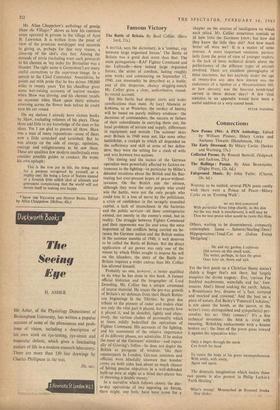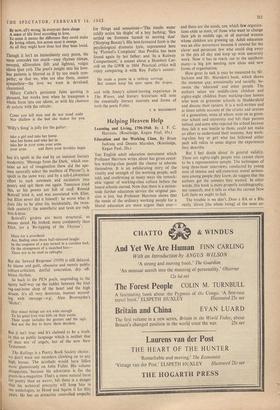Connections
New Poems 1961: A PEN Anthology. Edited by William Plomer, Hilary Corke and Anthony Thwaite. (Hutchinson, 18s.) The Railings : Poems. By Alan Brownjohn. (Digby Press, 12s. 6d.) WAITING to be melted, several PEN poets coolly wish there were a Prince of Peace—Hilary Corke on an 'Evening Walk': we are best concerned
With particular floras (step charily, in this dim Air the way back is treacherous), it well may be Thus we best praise what would be (were He) Him.
Others, waiting to be dismembered, compactly contemplate fauna — Salmon/Starling/Deer/ Hippopotamus/Toad/Cat or (Julian Eniss) 'Hedgehog':
. . . Me and my garden. I cultivate Old terrors on this small scale, The better, perhaps, to face the great Ones later on, thorn and nail.
Yet the best poem on a Christian theme doesn't clutch a finger that's not there, but largely imagines the divine tragedy : Eve, 'curious For freckled mushrooms, waterfalls and fur,' fore- mourns Abel's blood soaking the earth; Adam, a Renaissance boy, dreams of 'a face, tortured and mocked and crowned.' And the best on a piece of nature, Zod Bailey's 'Funereal Cockatoo,' is not about the bomb, or the parrot, or the writer's (very distinguished and sympathetic) per- sonality, but us: 'Only connect!' It's a fine technical invention: the bird is vivid with meaning, 'Rebuking endearments with a hoarse broken cry'; the lines of the poem press toward it against the separative wire:
Only a linger through the mesh Can brush his head To caress the body of his grave incomprehension With amity, with amity, Again and again.
The dramatic imagination which makes those two poems is also present in Philip Larkin's 'Faith Healing':
What's wrong! Moustached in flowered frocks they shake:
By now, all's wrong. In everyone there sleeps A sense of life lived according to love.
To some it means the difference they could make By loving others, but across most it sweeps As all they might have done had they been loved.
Though it isn't an immediately easy poem, the Verse concedes too much—easy rhymes (sleeps, sweeps), alliteration (lift and lighten), vulgar idiom (just yet). The poet's insight into his love- less patients is blurred as if by too much sym- pathy; so that we, who are also them, cannot sympathise—the love we want is devalued, chummied.
Hilary Corke's persistent faint quoting is pleasant, but works best when he transposes a whole form into our idiom, as with his chanson de toilette with the refrain: Come you tall man and do not stand aside Nor shallow is the bed she makes for you.
Villy's Song' is jolly for the guitar: take a girl and take her home take her home and take her in take her in your arms your arms your arms and there your troubles begin but it's spoilt at the end by an insistent literary modernity. 'Message from the Dark,' which con- tains an act of imagination (how did the ape- men naturally select the mothers of Phryne?), is spoilt in the same way; and by a sub-Lawrentian effort to suck automats and escalators into poetry and spit them out again. Tennyson tried this, so his poems are full of stuff. Ronald Bottrall tried it, and was associated with Eliot, but Eliot never did it himself : he wrote what it feels like to be alive (in, incidentally, the twen- tieth century); the anaesthetic and taxis are only bric-a.-brat.
Bottrall's girders are more structural, so sooner dated. He looked, more confidently than Eliot, for a 'Re-tipping of the Thyrsus': Hints for a prosthesis Are, finding once more half-shivered laughs In the suspense of a key turned in a corridor lock.
Or the strangeness of a snatched kiss—
These not to be read as epitaphs.
But the 'Inward Response' (1939) is still delayed, by blame and guilt, obsessive and merely public culture-criticism, dutiful concretion, dry off- bitten rhythm.
So back to the PEN poets, responding to the agony half-way up the ladder between the foul rag-and-bone shop of the heart and the high dream. It's all very decorous, manner accord- ing with message--e.g:, Alan Brownjohn's `Moles': Our minor beings are not wide enough To let great love rear hills on their estate.
Their scope includes the gesture and the sigh, But not the fire to leave them desolate.
But it isn't true; and it's claimed to be a truth, in this so public language which is neither that Of men nor of angels, but of the new New Testament.
The Railings is a Poetry Book Society choice : we don't want our members climbing on to any high horses. The accolade would have fallen more glamorously on John Fuller. His volume disappoints, because his adroitness is for the poem-in-a-magazine. That's a more natural form for poetry than an wuvre, btit there is a danger that his technical precocity will keep him in the anthologies, to Hood and Squire it for fifty Years. He has an attractive controlled empathy for things and sensations—`The tensile water coldly scales his thighs' of a boy bathing; 'flies settled on footmen turned to snoring dust' ('Sleeping Beauty'). His best-favoured form is the psychological dramatic lyric, represented here by 'Florizel's Complaint' that Perdita has been found again by her father; and 'In a Railway Compartment,' a sonnet about a Humbert Car- roll on the GWR in 1884 Practical critics will enjoy comparing it with Roy Fuller's sonnet : He reads a poem in a railway carriage But cannot keep his eyes upon the tropes, and with Jenny's school-leaving experience in The Waves, and literary historians will note the essentially literary interests and forms of both the poets Fuller.
J. B. BROADBENT


































 Previous page
Previous page